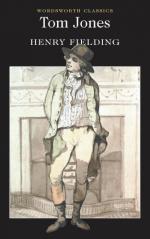|
This section contains 14,643 words (approx. 49 pages at 300 words per page) |

|
SOURCE: "Fielding: The Comic Reality of Fiction," in The First English Novelists: Essays in Understanding, edited by J. M. Armistead, Tennessee Studies in Literature, Vol. 29, University of Tennessee Press, 1985, pp. 109-42.
In the following essay, noted scholar and Fielding editor Sheridan Baker offers a thorough account of Fielding's approach to quixotic comedy in both his drama and his fiction. Calling the theater "Fielding's apprenticeship," Baker demonstrates that Fielding's early comic plays provided the groundwork for his didactic use of comedy in the novel.
Fielding's achievement in his four novels is immense. Joseph Andrews (1742) is not only the first English comic novel but the Declaration of Independence for all fiction. Jonathan Wild (1743), though imperfectly, turns Augustan satire into a novel. Tom Jones (1749) supersedes and absorbs the drama as the dominant form and, more significantly, culminates the Augustan world of poetry and Pope in the new poetics of prose. Amelia...
|
This section contains 14,643 words (approx. 49 pages at 300 words per page) |

|


